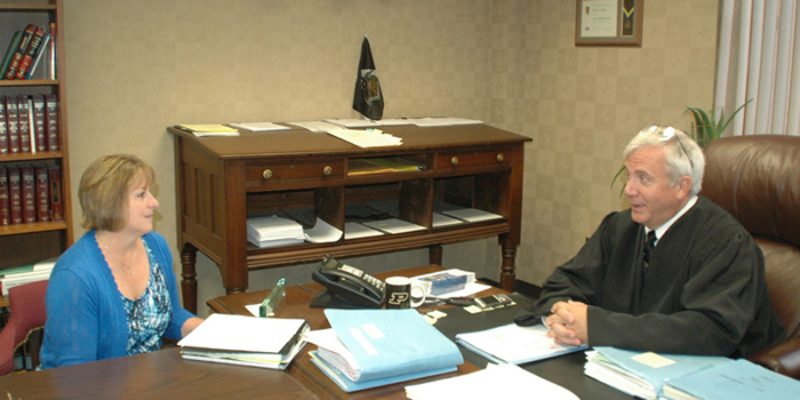CASA Director Cites ‘Pressing Need’ For Child Advocates

CASA director Mackenzie Cloutier, left, meets with Judge David Cates regularly to discuss cases involving the welfare of children. Last year saw a spike in cases in cases involving children in need of services, and CASA is holding a training session starting July 19 to meet the growing demand for child advocates in the court system.
WARSAW — A question often on people’s minds when they see the constant stream of bad news about meth labs, domestic violence or even bitter custody battles is, “Who’s looking out for the kids?”
In the Kosciusko County court system, one answer is court appointed special advocates, or CASA, a group of volunteers, trained citizens, who take 15 to 20 hours out of their lives each month to look out for children for whom home placement is being determined and who are often victims of abuse and neglect.
Currently there is an “unusually pressing need” for more volunteers, according to Mackenzie Cloutier, CASA director. From 9 a.m. to noon Tuesday, Wednesday and Thursday, starting July 19, classes are being held to train more volunteers to be sworn in Aug. 11.
“These folks are the eyes and ears of the court system,” explained superior court Judge David Cates. Judges often use CASA in custody situations. “To include the best interest of the child is the ultimate question,” he stated. However, in such battles, the judge usually only gets to hear from the parents and their lawyers, who are arguing for themselves more than for the children.
However, CASA’s main task is advocating for children in need of services, or CHINS. Every CHINS has a CASA advocate appointed to them, doing fact finding, interviewing relatives, teachers and others to discover the child’s best interest. “We meet with anybody involved in that child’s life,” Cloutier stated.
It is important to note CASA is not a replacement for the Department of Child Services or other state-appointed social workers. But those workers may have as many as 50 cases at a time, where a CASA volunteer only has one or two. The department is currently facing record numbers of assessments.
In fact, according to the American Civil Liberties Union website, in 2015 a DCS case manager filed a suit against the department, saying her case loads were so large she and her colleagues were unable to effectively protect and serve the public, though the case was eventually thrown out.
CASA was formed by a group of citizens and judges “who realized kids needed extra help,” Cloutier said. CASA advocates are independent appointees of the court, who help judges make informed decisions.
CASA advocates may provide practical help to children as well. According to Cloutier, advocates have the time to notice little things others miss. For instance, a child may need glasses and is sitting in the back of class. Perhaps they need braces; a volunteer can advocate for those necessities. They may notice kids suffering from not seeing their parents enough and advocate for more visitation, or, in some cases, less. They may also recommend the child have a Big Brother or Big Sister.
“I’ve yet to see a CASA advocate do a bad job,” Cates commented.
Cloutier marvels at the support available in Kosciusko County. “There are a lot of pros from the community.” As well as CASA and DCS, children may receive help from various community resources. Nevertheless, she added, “We do not have enough volunteers to meet the needs of the judges.”
Anyone interested in becoming a CASA volunteer can sign up for classes beginning July 19 by calling (574) 372-2401. For more information, go to www.casachildren.org
